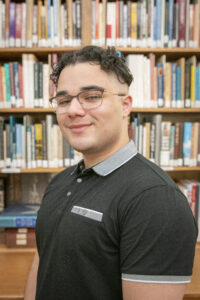This post is part of our blog series “Scholars Speak,” which features writing from our 2025 cohort of Preservation Scholars. Click the link to learn more about this donor-funded program that aims to increase the breadth of voices in the Texas historical narrative by placing students from underrepresented cultural and ethnic backgrounds in paid, 10-week long summer internship positions at the Texas Historical Commission.
Scholars Speak: The Public Service of Preservation for All

As I have progressed throughout my internship with the Friends of the Texas Historical Commission, I’ve come to understand how broad and layered public service and public history really are. Before starting, I knew public history involved preserving and sharing the past, but I did not realize just how many people, professions, and departments have to work together to make that possible.
The work of preservation reaches across so many different areas. I have learned about efforts in architecture, archaeology, education, and government at the local, state, and even federal levels. I now see how much detail goes into this work and how these pieces must come together to tell the full story of our communities. It has helped me appreciate how public service never really ends. There is always something more to uncover, preserve, or protect.
This internship has also made me reflect on my own history and future goals in a more personal way. One moment that really stuck with me happened while I was calling around forty-five different people in a row to get updates on County Historical Commissions. These were mostly CHC chairs or county offices, and I had a pretty standard list of questions. When I reached the chair for Harris County, I noticed his email had “law” in it. So, I looked him up and saw that he was a lawyer. After I asked my usual questions, he asked if I needed anything else. I said, “Actually, I saw you’re a lawyer,” and that led to a great conversation about my interest in law and public service. Before we finished, he offered to write me a letter of recommendation. He didn’t know me before that call, but he appreciated what I was doing and wanted to support my goals.
That conversation meant a lot to me. It showed me how strong connections can be made just by being curious, respectful, and honest. It also reminded me that public service is about people. Whether through history or law, I want to be someone who listens, helps, and makes things better. One day, I hope to be the kind of lawyer who offers the same kindness and support to someone just starting out, the way he did for me. This experience has strengthened my desire to become a lawyer who serves the public and uses the law to make a real difference in people’s lives.